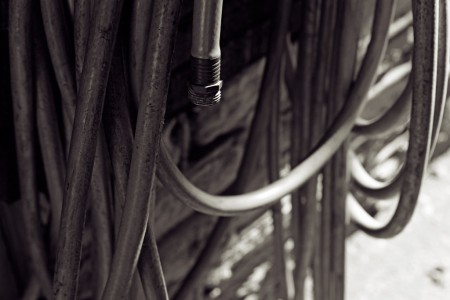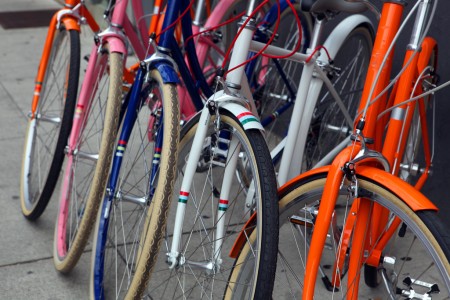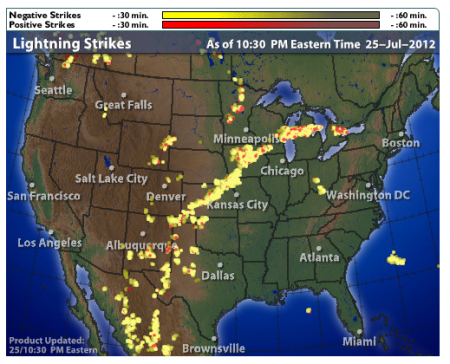Month: July 2012
Basketball hoop and blue sky
Garden hose
Colourful bikes
Pullman on religion and authority
Over my last few commutes, I read Phillip Pullman‘s short and unusual book The Good Man Jesus and the Scoundrel Christ. It’s part of the Canongate Myth Series, in which “ancient myths from myriad cultures are reimagined and rewritten by contemporary authors”. The book isn’t easily categorized, but includes a few thought-provoking passages, particularly about how institutions imbued with authority tend toward corruption and abuse.
For instance:
“As soon as men who believe they’re doing God’s will get hold of power, whether it’s in a household or a village or in Jerusalem or in Rome itself, the devil enters into them. It isn’t long before they start drawing up lists of punishments for all kinds of innocent activities, sentencing people to be flogged or stoned in the name of God for wearing this or eating that or believing the other. And the privileged ones will build great palaces and temples to strut around in, and levy taxes on the poor to pay for their luxuries; and they’ll start keeping the very scriptures secret, saying there are some truths too holy to be revealed to the ordinary people, so that only the priests’ interpretation will be allowed, and they’ll torture and kill anyone who wants to make the word of God clear and plain to all; and with every day that passes they’ll become more and more fearful, because the more power they have the less they’ll trust anyone, so they’ll have spies and betrayals and denunciations and secret tribunals, and put the poor harmless heretics they flush out to horrible public deaths, to terrify the rest into obedience.”
And:
“Lord, if I thought you were listening, I’d pray for this above all: that any church set up in your name should remain poor, and powerless, and modest. That it should wield no authority except that of love. That it should never cast anyone out. That it should own no property and make no laws. That it should not condemn, but only forgive. That it should be not like a palace with marble walls and polished floors, and guards standing at the door, but like a tree with its roots deep in the soil, that shelters every kind of bird and beast and gives blossom in the spring and shade in the hot sun and fruit in the season, and in time gives up its good sound wood for the carpenter; but that sheds many thousands of seeds so that new trees can grow in its place.”
Perhaps this book is to the New Testament what Pullman’s “His Dark Materials” trilogy was to Milton’s Paradise Lost – a fictional re-appraisal with an emphasis on a re-interpretation of certain moral elements.
Lightning strike maps
Working on climate change
I was out all day today with volunteers devoting their time to sharing the message about climate change and encouraging others to take action.
If the science is right, this is a critical time. These are the years in which humanity will either choose to abandon fossil fuels or choose to commit itself to catastrophic climate change. As such, there may be no more important topic to be working on.
That’s even more likely given how few people are actually doing it. Compare the amount of effort devoted to addressing humanity’s most important problem with the amount of effort devoted to putting up advertising, fancy hairdos, driving dirt bikes, or watching television. The fight for the future of the planet is being waged between a handful of activists and a set of massively profitable fossil fuel companies, while a largely apathetic mass of people mostly ignores it.
Norway’s response to terrorism
A year after Norway’s terrorist attack, I’d say the Norwegians are demonstrating the appropriate way to respond to terrorism: by refusing to be terrorized.
“There have been no changes to the law to increase the powers of the police and security services, terrorism legislation remains the same and there have been no special provisions made for the trial of suspected terrorists.
On the streets of Oslo, CCTV cameras are still a comparatively rare sight and the police can only carry weapons after getting special permission.
Even the gate leading to the parliament building in the heart of Oslo remains open and unguarded.”
I wish Canada and the United States had been courageous enough to follow this model, instead of doubling down on the military-industrial complex approach. Rather than responding to terror with courage and resilience, we have been driven by fear to create huge and unaccountable security states that are ultimately more dangerous than terrorist groups.
Summer greens
On types of watching
Riding the Toronto subway is a reminder of the different kinds of watching that exist in the world. For instance, there is overt watching of the kind done by security cameras, guards, and other staff members. There is also both overt and covert watching going on between passengers: some trying to use a pointed stare to press someone to discontinue an unwanted activity, some trying to use an overt appearance of awareness to drive sketchy characters toward less responsive prey, some trying to examine their fellow passengers without making that fact obvious.
Overt watching is a tactic. When someone chooses to watch overtly, it is usually because they are in a position of authority and seeking to control the behaviour of the people they observe. By contrast, covert watching is a capability. Whether you are able to do it or not depends on the people and resources you have at your disposal – as well as whether your target has any interest and capability in conducting counter-surveillance. Misdirection can be used as an aid to both covert and overt watching. For instance, shops employ fake security cameras to scare off potential thieves. Meanwhile, people with headphones in but no music playing can be ideally placed to overhead conversations unobtrusively.
To a considerable extent, organizations like the police and the TTC are defined by the capabilities they maintain; their intentions can sometimes be discerned through the tactics they use.








